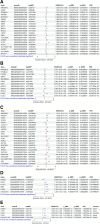Systematic druggable genome-wide Mendelian randomization identifies therapeutic targets for lung cancer
- PMID: 38834983
- PMCID: PMC11151555
- DOI: 10.1186/s12885-024-12449-6
Systematic druggable genome-wide Mendelian randomization identifies therapeutic targets for lung cancer
Abstract
Background: Drug repurposing provides a cost-effective approach to address the need for lung cancer prevention and therapeutics. We aimed to identify actionable druggable targets using Mendelian randomization (MR).
Methods: Summary-level data of gene expression quantitative trait loci (eQTLs) were sourced from the eQTLGen resource. We procured genetic associations with lung cancer and its subtypes from the TRICL, ILCCO studies (discovery) and the FinnGen study (replication). We implemented Summary-data-based Mendelian Randomization analysis to identify potential therapeutic targets for lung cancer. Colocalization analysis was further conducted to assess whether the identified signal pairs shared a causal genetic variant.
Findings: In the main analysis dataset, we identified 55 genes that demonstrate a causal relationship with lung cancer and its subtypes. However, in the replication cohort, only three genes were found to have such a causal association with lung cancer and its subtypes, and of these, HYKK (also known as AGPHD1) was consistently present in both the primary analysis dataset and the replication cohort. Following HEIDI tests and colocalization analyses, it was revealed that HYKK (AGPHD1) is associated with an increased risk of squamous cell carcinoma of the lung, with an odds ratio and confidence interval of OR = 1.28,95%CI = 1.24 to 1.33.
Interpretation: We have found that the HYKK (AGPHD1) gene is associated with an increased risk of squamous cell carcinoma of the lung, suggesting that this gene may represent a potential therapeutic target for both the prevention and treatment of lung squamous cell carcinoma.
Keywords: Colocalization; Druggable target; Gene expression; Lung cancer; Mendelian randomization.
© 2024. The Author(s).
Conflict of interest statement
The authors declare no competing interests.
Figures




Similar articles
-
Mendelian randomization analysis identifies druggable genes and drugs repurposing for chronic obstructive pulmonary disease.Front Cell Infect Microbiol. 2024 Apr 10;14:1386506. doi: 10.3389/fcimb.2024.1386506. eCollection 2024. Front Cell Infect Microbiol. 2024. PMID: 38660492 Free PMC article.
-
Multi-omics Mendelian randomization integrating GWAS, eQTL and pQTL data revealed GSTM4 as a potential drug target for migraine.J Headache Pain. 2024 Jul 22;25(1):117. doi: 10.1186/s10194-024-01828-w. J Headache Pain. 2024. PMID: 39039470 Free PMC article.
-
Association of genetically proxied cancer-targeted drugs with cardiovascular diseases through Mendelian randomization analysis.J Transl Med. 2025 Jan 6;23(1):14. doi: 10.1186/s12967-024-06027-4. J Transl Med. 2025. PMID: 39762845 Free PMC article.
-
Mitochondrial-related genome-wide Mendelian randomization identifies putatively causal genes in the pathogenesis of sepsis.Surgery. 2025 May;181:109150. doi: 10.1016/j.surg.2025.109150. Epub 2025 Feb 10. Surgery. 2025. PMID: 39933430 Review.
-
Mendelian Randomization Applied to Neurology: Promises and Challenges.Neurology. 2024 Feb 27;102(4):e209128. doi: 10.1212/WNL.0000000000209128. Epub 2024 Jan 23. Neurology. 2024. PMID: 38261980 Free PMC article. Review.
Cited by
-
Identification of therapeutic targets in lung adenocarcinoma using Mendelian randomization and multi-omics.Discov Oncol. 2025 Jun 7;16(1):1028. doi: 10.1007/s12672-025-02835-2. Discov Oncol. 2025. PMID: 40481979 Free PMC article.
-
Mendelian Randomization-Based Discovery of Novel Protein Biomarkers and Drug Targets in Colorectal Cancer: Validation Through Prognostic Modeling, Single-Cell Analysis, and In Vitro Cell Experiments.Appl Biochem Biotechnol. 2025 Jul 8. doi: 10.1007/s12010-025-05306-0. Online ahead of print. Appl Biochem Biotechnol. 2025. PMID: 40627109
-
Druggable genome-wide Mendelian randomization integrating GWAS and eQTL/pQTL data identifies targets for lung squamous cell carcinoma.Sci Rep. 2025 Aug 17;15(1):30116. doi: 10.1038/s41598-025-15977-8. Sci Rep. 2025. PMID: 40820226 Free PMC article.
References
-
- Ferlay J, et al. GLOBOCAN 2012 v1.0, cancer incidence and mortality worldwide: IARC cancer base no. 11. Lyon: International Agency for Research on Cancer; 2013.
MeSH terms
Grants and funding
LinkOut - more resources
Full Text Sources
Medical

